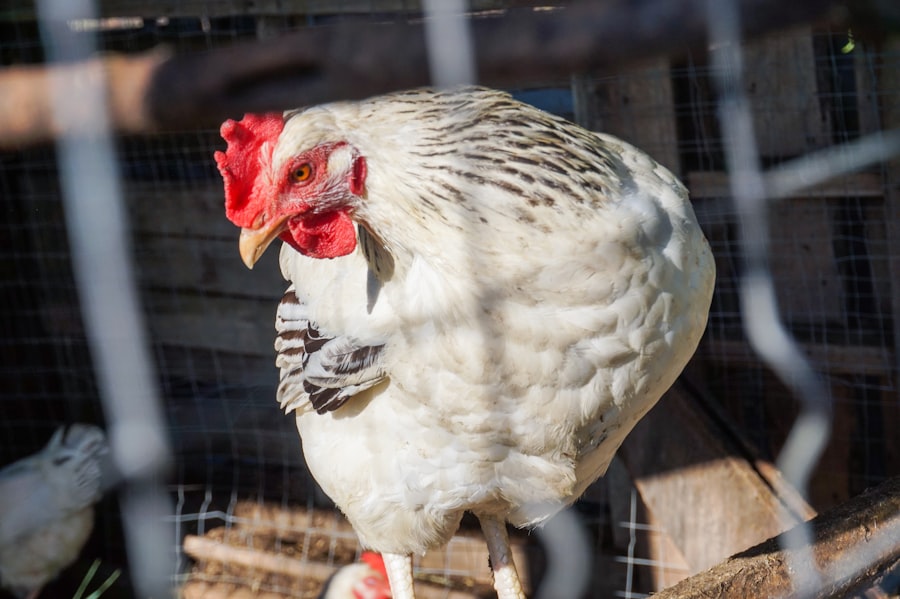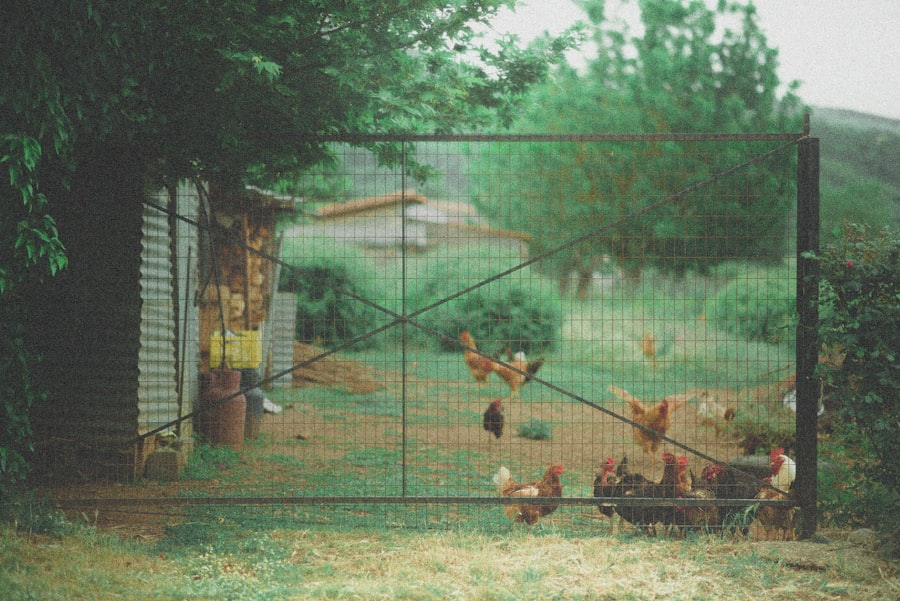Chickens are domesticated birds primarily raised for their eggs and meat, but they also serve as effective natural pest controllers. These birds possess an innate instinct to hunt and consume insects, making them a valuable asset in managing pest populations on various properties. By allowing chickens to roam and forage freely, property owners can utilize their natural pest control abilities to reduce unwanted insects in gardens, yards, and surrounding areas.
In addition to their agricultural value, chickens contribute significantly to maintaining ecological balance. Their foraging behavior helps regulate insect populations, potentially reducing the need for chemical pesticides and promoting more sustainable pest management practices. This article will examine chickens’ natural bug-hunting instincts, the advantages of employing chickens for pest control, the types of insects and pests that chickens can effectively manage, methods to encourage chickens’ bug-hunting behavior, and important considerations and potential drawbacks associated with using chickens as a pest control solution.
Table of Contents
- 1 The Natural Instinct of Chickens to Hunt and Eat Bugs
- 2 The Benefits of Chickens in Controlling Pest Populations
- 3 Types of Bugs and Pests that Chickens Can Help Control
- 4 How to Encourage Chickens to Hunt for Bugs on Your Property
- 5 Potential Drawbacks and Considerations of Using Chickens for Pest Control
- 6 Conclusion and Final Thoughts on Chickens as Natural Pest Controllers
- 7 FAQs
Key Takeaways
- Chickens are natural pest controllers and can help control bug populations on your property.
- Chickens have a natural instinct to hunt and eat bugs, making them effective at pest control.
- Chickens can help control a variety of pests including insects, grubs, and even small rodents.
- To encourage chickens to hunt for bugs, provide them with a natural environment and access to areas with pest populations.
- While chickens can be effective pest controllers, it’s important to consider potential drawbacks such as damage to gardens and the need for proper care and management.
The Natural Instinct of Chickens to Hunt and Eat Bugs
Hunting and Foraging Behavior
Their keen eyesight and quick reflexes make them efficient hunters, and they will actively pursue and capture insects with precision. Chickens are particularly fond of a wide variety of bugs, including beetles, grasshoppers, crickets, caterpillars, ants, flies, and even small rodents. They will scratch and peck at the ground, turning over leaves and debris to uncover hidden insects.
Benefits of Bug Consumption
Chickens are also known to consume ticks, which can be particularly beneficial in reducing the risk of tick-borne diseases for both humans and other animals. Their natural inclination to hunt for bugs makes them an invaluable asset in controlling pest populations without the need for harmful chemicals or pesticides.
Ecological Importance
By allowing chickens to engage in their natural behavior, we can harness their bug-hunting abilities to create a more sustainable and environmentally friendly approach to pest control. This not only benefits the chickens themselves but also contributes to a healthier ecosystem for all.
The Benefits of Chickens in Controlling Pest Populations

The use of chickens for pest control offers a multitude of benefits for both the environment and the property owner. By allowing chickens to roam and forage freely, you can significantly reduce the population of unwanted insects and pests on your property. This natural approach to pest management helps to maintain a healthy balance in the ecosystem while minimizing the use of chemical pesticides that can be harmful to the environment, wildlife, and human health.
In addition to their pest control abilities, chickens also provide other valuable contributions to the property. Their constant scratching and pecking behavior helps to aerate the soil and control weed growth, promoting healthier plant growth in gardens and yards. Furthermore, their droppings serve as a natural fertilizer, enriching the soil with essential nutrients that support plant growth.
By harnessing the natural behaviors of chickens, property owners can create a more sustainable and eco-friendly approach to maintaining their outdoor spaces.
Types of Bugs and Pests that Chickens Can Help Control
Chickens are effective at controlling a wide range of bugs and pests that can be detrimental to gardens, crops, and outdoor spaces. Some of the common pests that chickens can help control include beetles, grasshoppers, crickets, caterpillars, ants, flies, mosquitoes, ticks, and even small rodents. These pests can cause damage to plants, transmit diseases, and create nuisance issues for property owners.
By allowing chickens to forage for these pests, you can significantly reduce their populations and mitigate the negative impact they have on your property. Ticks are particularly problematic pests that can pose health risks to humans and animals by transmitting diseases such as Lyme disease and Rocky Mountain spotted fever. Chickens are known to consume ticks as part of their diet, making them an effective natural solution for controlling tick populations in outdoor spaces.
Additionally, mosquitoes are another common pest that can be effectively managed by chickens. Mosquitoes are not only annoying with their itchy bites but can also transmit diseases such as West Nile virus and Zika virus. By allowing chickens to hunt for mosquitoes, you can help reduce their numbers and minimize the risk of disease transmission.
How to Encourage Chickens to Hunt for Bugs on Your Property
Encouraging chickens to hunt for bugs on your property involves creating an environment that supports their natural foraging behavior. Providing ample space for chickens to roam and explore is essential for allowing them to seek out insects and pests. Allowing chickens access to areas with dense vegetation, leaf litter, and debris provides them with ample opportunities to uncover bugs hiding in these environments.
Additionally, incorporating diverse plantings in gardens and yards can attract a variety of insects that chickens will eagerly consume. In addition to creating a suitable environment for foraging, supplementing the chickens’ diet with insects can help encourage their natural hunting instincts. Mealworms, crickets, and other commercially available insects can be provided as treats or supplements to ensure that chickens have access to a diverse range of prey.
This not only supports their natural behavior but also provides additional nutrition that contributes to their overall health and well-being.
Potential Drawbacks and Considerations of Using Chickens for Pest Control

Preserving Beneficial Insects
While chickens are effective at controlling pest populations, they may also consume beneficial insects such as pollinators or predators of harmful pests. It is essential to strike a balance between controlling pest populations and preserving beneficial insects that contribute to a healthy ecosystem.
Property Management and Regulations
Allowing chickens to roam freely can pose challenges in terms of property management and potential conflicts with neighbors or local regulations. Chickens can cause damage to gardens, lawns, and landscaping features by scratching at the ground. Property owners should consider implementing measures such as fencing or designated foraging areas to prevent damage caused by free-ranging chickens.
Managing Chicken Droppings
Chicken droppings can have a significant impact on the property. While they serve as a valuable fertilizer, excessive accumulation can lead to nutrient runoff and potential water pollution issues. Proper management of chicken droppings through composting or strategic placement can help mitigate these concerns.
Conclusion and Final Thoughts on Chickens as Natural Pest Controllers
In conclusion, chickens offer a natural and sustainable solution for controlling pest populations on your property. Their innate instinct to hunt and eat bugs makes them valuable allies in maintaining a healthy ecosystem without the need for chemical pesticides. By providing an environment that supports their natural foraging behavior and supplementing their diet with insects, property owners can harness the pest control abilities of chickens while promoting a more eco-friendly approach to managing outdoor spaces.
While there are potential drawbacks and considerations associated with using chickens for pest control, proactive management strategies can help mitigate these concerns. By striking a balance between pest control efforts and preserving beneficial insects, property owners can maximize the benefits of using chickens as natural pest controllers while minimizing potential negative impacts. Overall, incorporating chickens into your pest management strategy offers a holistic approach that supports environmental sustainability, promotes healthy plant growth, and reduces reliance on chemical pesticides.
With proper planning and management, chickens can play a valuable role in maintaining a balanced ecosystem while contributing to a more sustainable and eco-friendly outdoor environment.
If you’re interested in learning more about the benefits of keeping chickens, you might want to check out this article on how many chickens you need for a family of 4. It discusses the practical aspects of raising chickens for eggs and meat, as well as the potential benefits of having them around to keep bugs away.
FAQs
What are the benefits of having chickens to keep bugs away?
Chickens can help control insect populations in your yard or garden by eating bugs such as beetles, grasshoppers, ticks, and even mosquitoes. This can reduce the need for chemical pesticides and promote a more natural pest control method.
What types of bugs do chickens eat?
Chickens are known to eat a wide variety of bugs including beetles, grasshoppers, ticks, mosquitoes, flies, and even small rodents. They are natural foragers and will actively seek out insects as part of their diet.
Do chickens eat harmful bugs?
Yes, chickens can eat harmful bugs such as ticks, which can carry diseases such as Lyme disease. By consuming these pests, chickens can help reduce the risk of insect-borne illnesses for both humans and other animals.
How many chickens do I need to keep bugs away?
The number of chickens needed to effectively keep bugs away will depend on the size of the area you want to protect and the severity of the bug problem. In general, a small flock of 3-5 chickens can make a noticeable impact on bug populations in a backyard or garden.
Are there any downsides to using chickens to keep bugs away?
While chickens can be effective at controlling bugs, they may also cause some damage to plants and landscaping as they forage for insects. Additionally, chickens may not be able to completely eliminate all bug populations, especially in larger areas.
Meet Walter, the feathered-friend fanatic of Florida! Nestled in the sunshine state, Walter struts through life with his feathered companions, clucking his way to happiness. With a coop that’s fancier than a five-star hotel, he’s the Don Juan of the chicken world. When he’s not teaching his hens to do the cha-cha, you’ll find him in a heated debate with his prized rooster, Sir Clucks-a-Lot. Walter’s poultry passion is no yolk; he’s the sunny-side-up guy you never knew you needed in your flock of friends!







